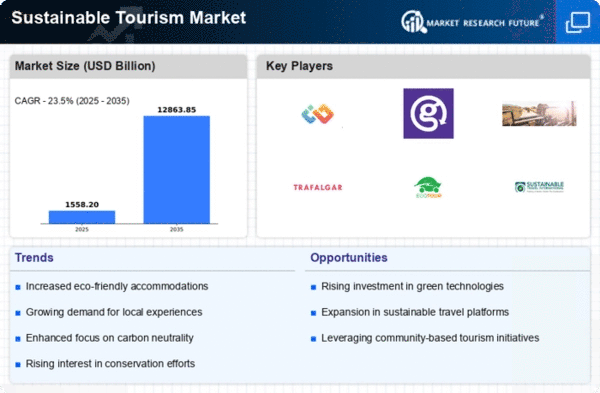Top Industry Leaders in the Sustainable Tourism Market
 Sustainable Tourism Market Outlook
Sustainable Tourism Market Outlook
The sustainable tourism market has evolved into a dynamic sector where environmental consciousness converges with the travel industry. As global awareness of climate change and ecological impact grows, travellers are increasingly seeking eco-friendly and socially responsible options. This shift has given rise to a competitive landscape that reflects the changing preferences of modern consumers.
Key Players and Market Dynamics:
- Beyond Holdings Proprietary Ltd.
- Aracari Travel
- Beyonder Experiences LLP
- BOUTECO Ltd.
- Earth Changers
- G Adventures
- Global Himalayan Expedition
- Intrepid Group
- Kind Traveler PBC
- Kynder
- Mojosurf
- NATIVE TOURS INC.
- Responsible Travel
- Rickshaw Travel Ltd.
- Steppes Travel Ltd.
- The Blue Yonder
- Undiscovered Mountains Ltd.
- Wild Frontiers Adventure Travel Ltd.
- Wilderness Safaris
Strategies Adopted:
The strategies employed by key players in the sustainable tourism market are diverse, reflecting the multifaceted nature of sustainability. TUI Group, for instance, has implemented a comprehensive sustainability strategy that includes carbon reduction initiatives, wildlife conservation projects, and partnerships with local communities. Intrepid Travel focuses on small-group travel experiences, minimizing the environmental impact and fostering meaningful connections between travelers and destinations. Responsible Travel, on the other hand, emphasizes transparency, allowing customers to choose trips based on the sustainability credentials of each tour.
Factors for Market Share Analysis:
Several factors contribute to the market share analysis in the sustainable tourism sector. The commitment to sustainable practices, scale of operations, geographic reach, and customer perception play pivotal roles. Companies that successfully integrate sustainability into their core values and operations tend to resonate more with environmentally conscious consumers. Additionally, a global presence and a diverse range of offerings contribute to market dominance.
New and Emerging Companies:
The sustainable tourism market is witnessing the emergence of innovative startups aiming to disrupt the industry with fresh approaches to sustainability. Examples include EcoTraveller, a platform connecting travelers with eco-friendly accommodations, and ClimatePerks, a company encouraging businesses to offer climate-positive benefits to employees. These newcomers bring agility and novel ideas to the market, challenging established players to continually adapt and improve their sustainability practices.
Industry News:
In recent industry news, there has been a notable trend towards collaboration and information sharing among sustainable tourism players. Partnerships between travel companies and environmental organizations have become increasingly common, creating synergies that amplify the positive impact of sustainability initiatives. Moreover, governments and international bodies are introducing regulations and certifications to standardize sustainable tourism practices, providing a framework for companies to follow and consumers to trust.
Current Company Investment Trends:
Investment trends in the sustainable tourism market reflect a growing recognition of its potential for long-term profitability. Companies are allocating resources to research and development of innovative green technologies for transportation, accommodation, and recreational activities. This includes investments in electric or hybrid vehicles, eco-friendly construction methods for hotels, and the development of low-impact tourism experiences. The financial community is also showing interest, with sustainable tourism funds gaining traction among investors looking for socially responsible opportunities.
Overall Competitive Scenario:
The competitive scenario in the sustainable tourism market is characterized by a delicate balance between cooperation and competition. While companies compete for the attention of eco-conscious travelers, there is also a shared commitment to driving positive change in the industry. Collaboration on sustainability initiatives, information sharing on best practices, and the formation of industry alliances underscore the collective responsibility felt by key players to address the environmental and social challenges associated with tourism.
Challenges and Opportunities:
As the sustainable tourism market continues to evolve, challenges and opportunities emerge. The challenge lies in maintaining a delicate equilibrium between meeting the growing demand for travel and mitigating the industry's impact on the environment. Opportunities, however, abound for companies that can innovate and adapt to the changing landscape. By embracing technology, fostering local partnerships, and consistently improving sustainability practices, companies can position themselves to thrive in this competitive yet collaborative market.
The competitive landscape of the sustainable tourism market reflects a paradigm shift in consumer preferences and industry values. Key players are not only vying for market share but also actively contributing to the global movement towards responsible travel. As new companies enter the scene with innovative solutions, and established players deepen their commitment to sustainability, the overall trajectory of the market is towards a more eco-conscious and socially responsible future. The true winners in this landscape will be those who not only navigate the challenges but also seize the opportunities presented by the green horizon of sustainable tourism.
Recent News :
1 .Airbnb (ABNB):
Launched a 'Climate-Friendly Stays' filter to highlight eco-conscious accommodations with energy-efficient practices, recycling programs, and sustainable local food options.
Partnered with the World Wildlife Fund (WWF) to promote regenerative tourism projects around the globe, supporting local communities and protecting ecosystems.
- Booking Holdings (BKNG):
Established a Sustainable Travel Advisory Board to guide their sustainability initiatives and ensure responsible tourism practices across their platforms.
Launched a carbon offsetting program for customers to voluntarily contribute to sustainable projects, mitigating the environmental impact of their travel.
- Marriott International (MAR):
Announced a goal to operate carbon-neutral hotels by 2050, focusing on renewable energy, energy-saving measures, and carbon capture technologies.
Launched a 'Serve360: Do Good. Feel Good' initiative empowering employees to engage in local community volunteer projects, fostering meaningful connections and positive impact.
- Intrepid Travel (INPTF):
Unveiled new carbon-neutral tours focusing on low-impact activities, renewable energy-powered transportation, and supporting local conservation efforts.
Emphasized cultural immersion and responsible engagement with communities, promoting respect for local traditions and environments.

